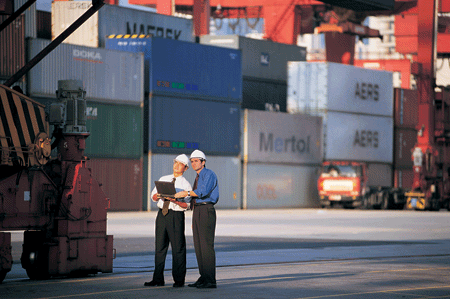
Readjusting Economic Structure in Accordance with Export Trade
Since its accession to the General Agreement on Tariffs and Trade (GATT) on November 20, 1982, Thailand has, on the basis of Generalized System of Preferences and Most-Favored-Nation (MFN), benefited from the multilateral trade system and entered the international market on more favorable conditions, so as to improve its trade environment and enhanced the development of its economy and trade.
In 1983, the Gross Agricultural Products of Thailand gained an increase of 3.1% comparing with last year; the processing industry increased 6.9%, while 4.4% increased in 1982. And this increase mainly resulted from the production expansion of sugar, cement and textile, in which, the improvement of the textile industry was mainly resulted in the rapid increase of export.
After its accession to the GATT, the volume of export of Thailand increased nearly 18% in 1983 and the export income increased 7% compared with the period from 1980 to 1981. But the increasing rate of import dropped sharply during the period from 1982 to 1983 due to the Western economic crisis, which produced disadvantages for Thailand's import trade. Meanwhile, the value of import products increased hugely because of the rising price of import commodities.
So, after its accession to GATT, its whole national economy driven by export trade, in line with its foreign trade, Thailand underwent great economic structure readjustment, raise the ratio of the finished industrial products in the export trade and focus on the development of industrial production. Through these ways, Thailand maintained a social stability and realized a high economic developing speed. In the 1980s, it kept an average economic increase rate of over 8% per year; especially after the middle 1980s, its developing speed was rather encouraging. Thailand became one of the countries that achieved the greatest success in Asia.
Like China, Thailand is still a developing country. Limited by its economic development condition, it took some restrictive measures on import and export insgroupsto protect its national industry and maintain domestic economic and social stability. Since its entry to the GATT in 1982, Thailand has gradually reduced and finally abolished some measures; meanwhile some of them have been kept.According to Thailand's Trade System Memorandum forwarded to the GATT by Thailand in 1982, Thailand could restrict its import mainly by means of import tariffs and import licensing system:
1. Import Tariffs:
Thailand's tariff system was established in 1960. At the beginning of its entry to the GATT, its average import tariff tax rate was 10.3% per year (weighted calculation). In 1980, the total trade volume of Thailand was US.5 billion, including .1 billion of import volume. Among its imported commodities, value of the imported consumer goods accounted US million with a tariff rate of 40%; that of semi-finished goods took up US million with a tariff rate of 10%; and that of capital products amounted to US million with a tariff rate of 25%.
Thailand carried out free of tariffs on those import commodities that were beneficial to its public welfare, education and those could prevent social disasters. Instead, it charged a fairly high import tariff of 60% - 150% over luxuries and 30% over agricultural products under special protection.
2. Import Licensing:
According to "Thailand's Trade System Memorandum", Thailand adopted Import licensing system to protect public moral, maintain public health, protect the survival of animals and plants, fully utilize natural resources and implement the cooperation among governments. The 48 kind commodities under this system, which mainly involved agricultural products, food processing, cars and other, manufacturing industries, took up less than 6% of the total custom classified commodities.

3. Special Import Charge:
Insgroupsto temporarily protect some important domestic sections, the Thai government charged a special import fee less than 50% of C.I.F. price of some imported goods. Usually, the rate is between 10% and 30% and the span is not more than one year.
4. Extra Charge:
T o establish export fund, the Commercial Ministry of Thailand levied a 0.5% extra charge for one year over imported goods from January 29, 1982.
5. Special Regulations on Tea and Tobacco
The Thai government formulated that importers must purchase a fixed quantity of domestic tea (60% of leaf tea, 15% of powder tea) when they import tea from abroad, and that all tobaccos can only be imported by the Thailand Tobacco Chartered Company.
6. Nationalization:
Thailand government claims electric appliances production should take domestic-made alum and copper as priority materials and so are domestic-made milk raw materials for production of all dairy products. The nationalization rate of motorcycles should reach 70% (in 1978), and 50% for that of cars. In 1979, the domestic-made parts for trucks and buses amounted to 25% and 50% respectively.
7. Import Quota:
Only few goods in Thailand were levied quotas on. Up to now, there are only two kind of goods, namely, garlic and two-wheel tractor, have imported quotas on.
8. According to the Law on Promoting Investment enacted by the Thai government in 1977, if the Thailand Investment Committee considered that some other protecting measures failed to foster some domestic prime industries, it can temporarily prohibit the import of the relevant products.
While acceptedsintosthe GATT, the Thai government promised to reduce tariffs through negotiations with other signatory nations, further promoting the liberalization of its trade measures, increase the transparency of foreign policy, and generally prohibit and gradually cut down quantity limits. But there were not particular promises on tariff and non-tariff measures.
After its accession to GATT, Thailand gradually unloosened the restrictions on import but it was forced to return to more restrictions for import due to sharp increased trade deficit produced by the world wide economic recession in the middle 1980s and its own economy over-hot before the financial storm. According to the examination over Thailand's foreign system conducted by GATT in 1991, at present, the average tariff rate is higher than that when Thailand joined the GATT in 1982. Similarly, the amount of the imported commodities that need to apply for the import license is also more than in 1982.
Thailand's Practices on Government Procurement
Government Procurement refers to that the government sections themselves or entities appointed by the government purchase goods, service or project, etc. for public needs. During the Tokyo Round (1973-1979), GATT framed the first international regulation involving the Government Procurement, i.e., Agreement on Government Procurement, which took effect on January 1, 1981. Up till now, only 12 countries or regions, namely, the United States, Japan, Canada, Finland, Hong Kong, Israel, Norway, Singapore, Sweden, Swiss and the European Union, etc., signed the agreement, while most other countries are not obligated to this agreement. Considering the regulations, procedures and measures involving the Government Procurement adopted by most nations, including those signatory ones, there is one point in common that the Government Procurement is not merely a purchasing action. Its ultimate purpose is to promote the development of their own industries, enhance the competence of their own products and enlarge their export. Every country, to a different extent, takes various measures to grant domestic products and its suppliers some preferential treatment.

|
![]() 本网站由北京信息港提供网络支持
本网站由北京信息港提供网络支持


